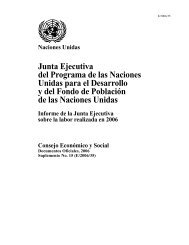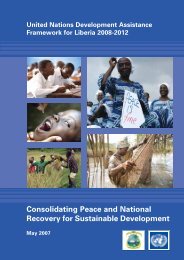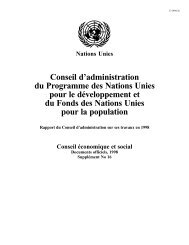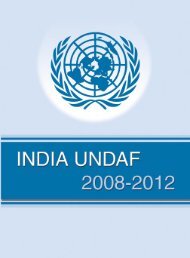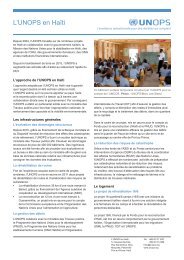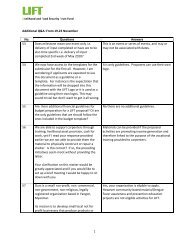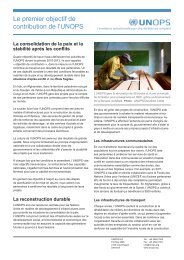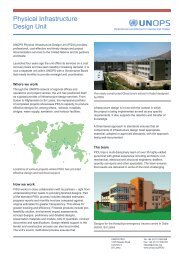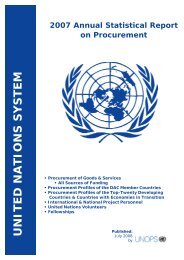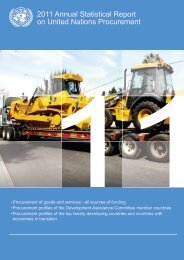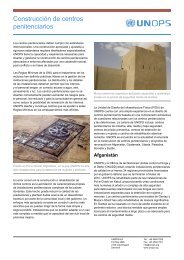English - UNOPS
English - UNOPS
English - UNOPS
You also want an ePaper? Increase the reach of your titles
YUMPU automatically turns print PDFs into web optimized ePapers that Google loves.
E/2004/35<br />
Video link with the Lesotho country team<br />
137. The country team in Lesotho, introduced by the resident representative/resident<br />
coordinator, explained how the resident coordinator system in Lesotho supported the<br />
common country assessment, United Nations Development Assistance Framework<br />
and poverty reduction strategy paper processes, and their alignment with the<br />
Millennium Development Goals.<br />
138. Speakers agreed that progress made in the resident representative/resident<br />
coordinator system was yielding tangible results, though resources destined for<br />
Lesotho had dwindled even for HIV/AIDS programmes, making ‘scaling up’<br />
impossible. Some suggested that work towards a stronger system could be funded<br />
by the United Nations as a whole or by individual countries. They emphasized that a<br />
resident representative/resident coordinator needed a balance of personal qualities<br />
and substantive knowledge. It was stressed that in crisis and post-crisis situations<br />
United Nations organizations had to work in coordination, not in competition with<br />
each other.<br />
Closing remarks by the UNDP Administrator<br />
139. The Administrator stated that, in future, resident representatives/resident<br />
coordinators would contribute to the evaluations of country team members with the<br />
support of their respective regional directors. He noted the need for additional<br />
resident representative/resident coordinator candidates with humanitarian<br />
backgrounds. He acknowledged delegations’ funding suggestions, mentioned the<br />
trust fund for the resident coordinator system support, and indicated that core<br />
resources were increasing. The United Nations country presence should be adequate<br />
and relevant rather than large and fragmented – and United Nations organizations<br />
must work in close, constant collaboration with donors and governments in order to<br />
remain relevant.<br />
Security<br />
140. Following opening remarks by the President of the Executive Board of<br />
UNDP/UNFPA, the Executive Director of UNICEF, representing UNDP, UNFPA,<br />
WFP and UNICEF, briefed delegations on United Nations staff safety and security.<br />
She said that the full text of her statement would be made available on the UNICEF<br />
web site.<br />
141. Delegations encouraged intensification of efforts at all levels to ensure staff<br />
safety and security, including strengthening local support to United Nations<br />
missions, ensuring investigations of attacks, and punitive measures against<br />
perpetrators of crimes. The role of host governments in bringing to justice those<br />
responsible for attacks/threats was underscored. Delegations inquired if the lack of<br />
cooperation from host governments resulted from lack of capacity or lack of<br />
commitment. They asked about measures being undertaken to restore confidence in<br />
the United Nations. Delegations were interested in knowing how to ensure<br />
23




